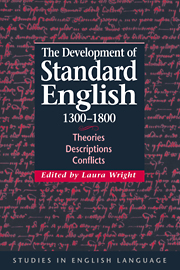Book contents
- Frontmatter
- Contents
- List of contributors
- Acknowledgements
- Introduction
- Part one Theory and methodology: approaches to studying the standardisation of English
- 1 Historical description and the ideology of the standard language
- 2 Mythical strands in the ideology of prescriptivism
- 3 Rats, bats, sparrows and dogs: biology, linguistics and the nature of Standard English
- 4 Salience, stigma and standard
- 5 The ideology of the standard and the development of Extraterritorial Englishes
- 6 Metropolitan values: migration, mobility and cultural norms, London 1100–1700
- Part two Processes of the standardisation of English
- Index
1 - Historical description and the ideology of the standard language
Published online by Cambridge University Press: 30 September 2009
- Frontmatter
- Contents
- List of contributors
- Acknowledgements
- Introduction
- Part one Theory and methodology: approaches to studying the standardisation of English
- 1 Historical description and the ideology of the standard language
- 2 Mythical strands in the ideology of prescriptivism
- 3 Rats, bats, sparrows and dogs: biology, linguistics and the nature of Standard English
- 4 Salience, stigma and standard
- 5 The ideology of the standard and the development of Extraterritorial Englishes
- 6 Metropolitan values: migration, mobility and cultural norms, London 1100–1700
- Part two Processes of the standardisation of English
- Index
Summary
Introduction
It has been observed (Coulmas 1992: 175) that ‘traditionally most languages have been studied and described as if they were standard languages’. This is largely true of historical descriptions of English, and I am concerned in this paper with the effects of the ideology of standardisation (Milroy and Milroy 1991: 22–3) on scholars who have worked on the history of English. It seems to me that these effects have been so powerful in the past that the picture of language history that has been handed down to us is a partly false picture – one in which the history of the language as a whole is very largely the story of the development of modern Standard English and not of its manifold varieties. This tendency has been so strong that traditional histories of English can themselves be seen as constituting part of the standard ideology – that part of the ideology that confers legitimacy and historical depth on a language, or – more precisely – on what is held at some particular time to be the most important variety of a language.
In the present account, the standard language will not be treated as a definable variety of a language on a par with other varieties. The standard is not seen as part of the speech community in precisely the same sense that vernaculars can be said to exist in communities.
- Type
- Chapter
- Information
- The Development of Standard English, 1300–1800Theories, Descriptions, Conflicts, pp. 11 - 28Publisher: Cambridge University PressPrint publication year: 2000
- 25
- Cited by

